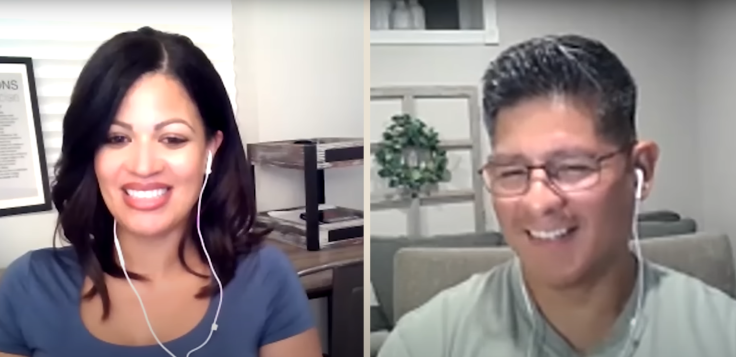Man Hides $520K Debt From Wife 'To Shield Her From The Stress': What Did He Spend On
Couples that merge finances are generally happier

Cassandra, 40, was in for a shock debt reveal when she asked her husband, Aldo, 41, about their debt liabilities. Aldo, who works in a finance role and earns over $100,000 annually, said the debt amounted to over half a million dollars with $66,000 in collections due to months of missed payments.
Cassandra and Aldo have been married for 18 years and have two kids. They jointly earn $165,408 annually. The couple was watching the Netflix show "How to Get Rich" when Cassandra suddenly asked Aldo about the debt situation. Soon after, they got into a call with the show's founder and multi-millionaire author, Ramit Sethi, for some advice.
Sethi, in his podcast "I Will Teach You To Be Rich," offered a deep dive into the couple's situation and what other couples can learn from their journey. The first thing Cassandra did after learning of their situation was "grab a pen and a paper" and chalk out a plan of all their loans and penalties. When Aldo helped her write it down, Cassandra said she "almost fell off the chair. I was floored."
Hiding Debt For Years
For Aldo, it was one of the toughest conversations, and he was clearly disappointed in himself. Although he had intended to share the loan details for years, Aldo saw it through only when Cassandra asked.
Talking about finances can be difficult, especially debt. Hiding debt can be easier than talking about it, which is very common. A Cooperative Bank survey revealed that couples are hiding $41 billion in debt from each other. Further, one in seven men concealed debt details from their partner.
Aldo said he didn't want to stress Cassandra out with the details. Sethi noted that we avoid money talk for the same reason as health. Most of us hardly take action as long as the problems or symptoms are not really "acute."
Aldo Didn't Focus on Budgeting
Aldo, the money person in the relationship, says it means providing stability and paying the bills, but he doesn't do budgeting. He attempted to categorize spending but never stuck with the plans.
According to Bankrate, 38% of high earners with annual salaries above $100,000 have credit card debt. Further, 48% of those earning six figures lived paycheck to paycheck.
Sethi believes these actions are similar to what we did as children, like wanting to "live in a palace or fly a fighter jet, and as adults, we tend to do a similar thing with money." Sometimes, we go into denial and tend to ignore the red flags in finances, pretending everything is on track, he said, adding that "in Cassandra and Aldo's case, they've ignored reality."
Sethi highlighted people also blame debt on their low-income levels and get caught in a cycle of debt consolidation and balance transfers.
Work Together As a Couple
Cassandra, with decades of experience in the healthcare industry, took little interest in finances. She recently learned she was losing $380 on her bi-weekly paychecks as they were being garnished for back taxes she owed. It's understandable, given that Aldo willingly took charge of finances. However, Aldo wished she would also engage in household budgeting.
At the same time, Cassandra expected her husband to disclose these details much earlier. She knew only about the mortgage, credit cards, student and personal debt, and a business loan.
Being transparent about finances in a relationship can help avoid pitfalls and deal better with existing troubles. According to research from Indiana University Kelley School of Business, couples who manage finances together are happier and stay together longer.
Where Did Aldo Lose His Money?
Apart from withdrawing from his 401(k), Aldo got involved in day trading meme stocks and told Cassandra he was making a lot of money. He also convinced Cassandra that he'd take out a loan to renovate the house and pay it off using stock profits.
The worst part is that he invested half of the loan money, $30,000, and turned it into $189,000 but didn't cash in. He ended up taking out $50,000 but lost the rest.
Ultimately, the renovation cost them much more than anticipated. Sethi, a staunch believer that it is cheaper to rent than buy a house in most U.S. cities, said: "When you renovate your house, you almost never make money on the renovation."
Does Upbringing Play a Part?
For decades, money has been Aldo's source of stress. His dad and uncle weren't great with money, and he often heard tense conversations about bills and rent. Aldo's mom tried to stop the household from falling apart, and that would lead to arguments. In turn, he never asked anything from his parents.
Now, Aldo doesn't know how to communicate any financial worries to his wife because he wants to protect her from what has troubled him for life. Aldo said: "I thought I was protecting her, but I was just delaying, and now it's much worse."
Sethi said: "It's a loving gesture by Also to take it all on himself, but probably the wrong approach because ironically, by not talking about money, he's caused even more stress."
He added that most people want to play "Hero" and become the provider by saying yes to things they can't afford. However, the real hero, according to Sethi, is someone who "builds a partnership with their spouse to talk about money regularly, and truly includes their spouse in decision-making."
What's Ahead For The Couple?
Sethi estimated that the couple spent a whopping 94% of their take-home salaries on fixed costs, mostly debt and mortgage payments.
When it comes to providing for kids, Cassandra and Aldo go all out to get them the best things. Aldo thinks it is not good to let the kids know that the family is financially vulnerable. Sethi argued that we don't have to disclose everything, and it is wrong to tell them there's a "magic box" that'll get you everything.
Looking ahead, he suggested the couple use 80% of their bonuses to pay off personal and credit card loans. Sethi also urged them to dramatically cut expenses, including no vacations, casual shopping, and canceling unrequired monthly subscriptions for at least a few years.
He also highlighted that focusing on debt with the highest interest rates (the Avalanche method) and contributing an extra $100 a month can make a huge difference. At the end of the discussion, the couple was surprised to learn how quickly they could turn around their debt situation with a proper plan, set rules, and the will to execute it.
© Copyright IBTimes 2025. All rights reserved.






















